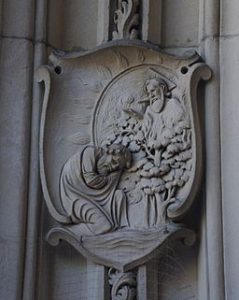by Lois Tverberg
Moses said to the LORD, “O Lord, I have never been eloquent, neither in the past nor since you have spoken to your servant. I am slow of speech and tongue.” The LORD said to him, “Who gave man his mouth? Who makes him deaf or mute? Who gives him sight or makes him blind? Is it not I, the LORD? Now go; I will help you speak and will teach you what to say.” But Moses said, “O Lord, please send someone else to do it.”
– Exodus 4:10-12
When God first appeared to Moses and told him to go to Pharaoh, Moses had the chutzpah to say to God, “Please send someone else!” We are amazed at Moses’ repeated refusal to do what God asked. How could that be?
The text says that Moses doubted his own abilities. Perhaps he was thinking that God was asking  him to somehow go convince Pharaoh to release the Israelites from slavery all on his own. What an impossibility that a stuttering 80-year old shepherd could do such a thing! Perhaps he imagined that God was telling him to raise up a rebellion who could demand release from Pharaoh. In his younger days when he was passionate for justice, maybe he could have done it, but not now. Surely God couldn’t use him.
him to somehow go convince Pharaoh to release the Israelites from slavery all on his own. What an impossibility that a stuttering 80-year old shepherd could do such a thing! Perhaps he imagined that God was telling him to raise up a rebellion who could demand release from Pharaoh. In his younger days when he was passionate for justice, maybe he could have done it, but not now. Surely God couldn’t use him.
Maybe part of Moses’ response was because he had forgotten his people’s sufferings, feeling that he had left his people behind when he fled to the desert forty years ago. When he was a younger man, his anger at his people’s misery caused him to kill, but maybe now he felt differently after finding a peaceful life in another land. Wasn’t their bondage someone else’s problem? Certainly someone should do something about it, but why should he be the one to take on such a difficult, dangerous mission?
Or, perhaps he doubted God. No one had heard anything from this God in four hundred years, and in Egypt, Moses learned that there were many small gods that shared power with others. How could this one defeat the many gods that ruled over Egypt, who had made it a super-power of the ancient world? This god was unknown – only the private god of his family, not of a mighty nation. God certainly was no match for the powers of Egypt.
Whenever any of us feel God is calling us to serve him, these are all typical human responses – either to doubt ourselves or how much God will help us, or how much God is even capable of doing. And we might even secretly say to ourselves, “Yes, someone needs to do something, but why should it be me?” We can learn a lesson from knowing that despite Moses’ doubts in himself and in God, God refused to change his mind about using him. We can all be encouraged that God never gives up on us. With our willingness, God will not fail at all that he has appointed us to do.
Photocred: Nheyob

